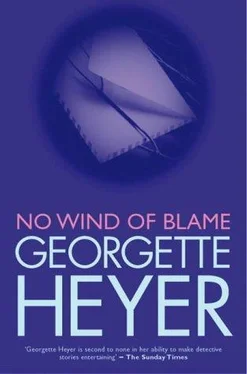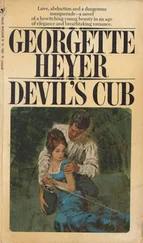"Yes, but according to Miss White, it was then that he asked her why she hadn't brought any cigarettes out."
"It was, eh? After Carter had been seen?"
Cook raised his eyes from the folder, and gazed frowningly into space. "Yes, after Carter had been seen. She said she'd go and get the cigarettes, but he told her not to bother, and walked over to his study window, which, as you know, Inspector, is hidden from the hedge by a bed full of flowering currant bushes, and the like."
"Go on," said Hemingway. "What happened next?"
"Miss White said she was standing looking down to the bridge, when suddenly the shot sounded, and she saw Carter fall. I asked her particularly, at the time, if she'd noticed any movement in the shrubbery, and she said no, she hadn't noticed anything."
Hemingway looked a little disappointed. "No," he said, scratching his chin, "that won't do. Not as it stands. There must have been something else happened after White went to the study window, and before Miss White saw Carter fall. If there wasn't anything, then I'll have to own I don't see how White could have done it."
"Well, nothing did happen," said Cook. "I remember Miss White saying that she was just standing there, not thinking of anything in particular," He stopped. "Now, just a moment! The gate! She said she was thinking that the hinges on it ought to be oiled, or something of the sort. They certainly do creak badly. I wonder: would that sort of fit in?"
"It might. The creak of the gate being the signal, in a manner of speaking. Though it doesn't explain how White could have fired that shot. However, there's no sense in trying to rush things. What happened when Carter fell?"
"Miss White screamed," replied Cook. "White asked her what the devil was the matter - he's a testy chap, you know - and she must have told him, I suppose, for he came over to her, to see for himself. Yes, and he had a box of cigarettes in his hand right enough, for he chucked it on to one of the chairs, and I saw it there myself, with the cigarettes spilled all round it. No hanky-panky about that. He said he was going to reach in through the study window for a box of cigarettes, and that's just exactly what he did do."
"While his son shot Carter," interjected Sergeant Wake.
Cook turned his head. "What's that? Young White? I don't see him doing it myself."
"Wake's got a notion it was a put-up job between the two Whites," explained Hemingway.
"Well, that would surprise me!" said Cook. "Why, it's common knowledge young Alan loathes his father! And as for him firing a rifle, I doubt if he'd know how. He's a regular wet, that chap: doesn't hold with bloodsports, and talks a lot of half-baked stuff about Bolshevik Russia, and that kind of thing."
Hemingway lifted an eyebrow at his subordinate. Wake said obstinately: "It's wonderful what a difference money can make to a man. Supposing that quarrel he and his father had at lunchtime, on the Sunday, was just a blind to make us think they weren't on good terms?"
"Then by all accounts they've been putting up those blinds ever since they came to the district," said Cook dryly. "No, I reckon that's straight enough: there's no love lost between White and his son."
"Does White hate his son enough to send him out to murder Carter for him?" asked Hemingway.
"Good Lord, no, Inspector!" replied Cook, quite shocked. "Why, that would be downright wicked! Things aren't as bad as that! Stands to reason they can't be, or they wouldn't live in the same house."
"That's what I thought. Go back to the moment when White chucked the cigarettes into the chair, will you? What happened next?"
"He shouted to Jones and Miss White not to stand staring, but to come down to see what they could do for Carter, and set off for the bridge. They ran after him, of course, but Carter must have been dead before they got there."
"In fact," said Hemingway, "White got his two witnesses out of the way, for it's not to be supposed they'd pay attention to anything except Carter's body, once they'd been set on to look after him."
"You can put it that way if you like," Cook said, staring.
"Seems to me a natural thing for them all to run down to the bridge."
"It's too natural," said Hemingway. "The whole of it. There's something fishy about this chain of highly plausible circumstances. There was a very good reason for asking Carter over in the first place, and that same reason made it lookk as though White was the last person to want him dead."
"Yes, but that's twisting things round, sir!" protested Wake.
"Maybe, and maybe it's doing exactly the opposite. You keep quiet! What about the fair Ermyntrude's instinct? Go on, Cook! What happened on the bridge?"
"White told Miss White to try and stop the bleeding, and ran back to the house to get hold of a doctor, and to ring us up.
Hemingway nodded approvingly. "And very right and proper, I'm sure! Where's the telephone?"
"In the hall. I saw it," replied Cook.
"You don't say! So that it would be highly natural for Mr. White to run round the corner of the house, so as to go in by the front door, thus disappearing from sight of the bridge, behind those rhododendrons?"
"Yes," Cook said. "Yes, it would. You think he went into the shrubbery, once the other two couldn't see him? Well, now you put me in mind of it, Miss White said that it seemed ages before he got back to them. I didn't set much store by that, for no doubt it would seem ages, under the circumstances. But even supposing you're on the right track, I still don't see how he can have fired that rifle in the first place. Of course, I realise there would have had to have been a bit of mechanism used, which he'd got to get rid of quick. That's plain enough. What isn't plain at all, not to my way of thinking, is what actually fired the rifle. It can't have been the opening of the gate, now, can it?"
Hemingway looked at Sergeant Wake. "Do you remember those scratches on that sapling?" he demanded. "Do you remember I said we'd keep them in mind? They've got a bearing on the case! In fact, I've a strong notion I know what caused them. If that rifle wasn't fired by hand, it had to be rigged up somehow, and what's more, rigged up nice and securely, because if it wasn't held hard, the recoil would spoil the aim. What about one of those vices they use for cleaning guns? Clamp that to a handy young tree, get your rifle sighted along the bridge, and that's one problem solved."
"Wait a bit, sir!" said Wake. "I've seen those vices. You can tilt the rifle any way you please in them, so even allowing for the bridge's being a good way below the sapling, why would anyone fix the rifle up so close to the ground? For the grazes weren't but a foot or two up, were they?"
Hemingway was not in the least put out of countenance by this. He said briskly: "We'll probably find there was a reason for that. As a matter of fact, I've found it already. There's a drop of seven or eight feet to the level of the bridge, and it stands to reason our bird wanted to get as low a trajectory as possible."
"There was something more than a vice there," said Cook, thinking it over. "The vice didn't fire the rifle. Why why, now we begin to understand that hair-trigger pull!"
"You cast your mind back again, and see if there isn't another peculiar circumstance which you begin to understand," recommended Hemingway. "What's that?"
"Miss Fanshawe's dog didn't bark," said Hemingway. "And why not? Because there wasn't anyone there to bark at. Funny how simple things are as soon as you stop looking at them from the wrong angle!"
"I certainly think you're on to something," admitted Cook. "I suppose I ought to have been on to it myself."
"You? Why, it's taken me long enough!" said Hemingway. "I don't blame you for not spotting it. You got the gun, and there wasn't a ha'porth of reason why anyone should have tumbled to it that it wasn't fired by some bloke who dropped it, and made off."
Читать дальше








